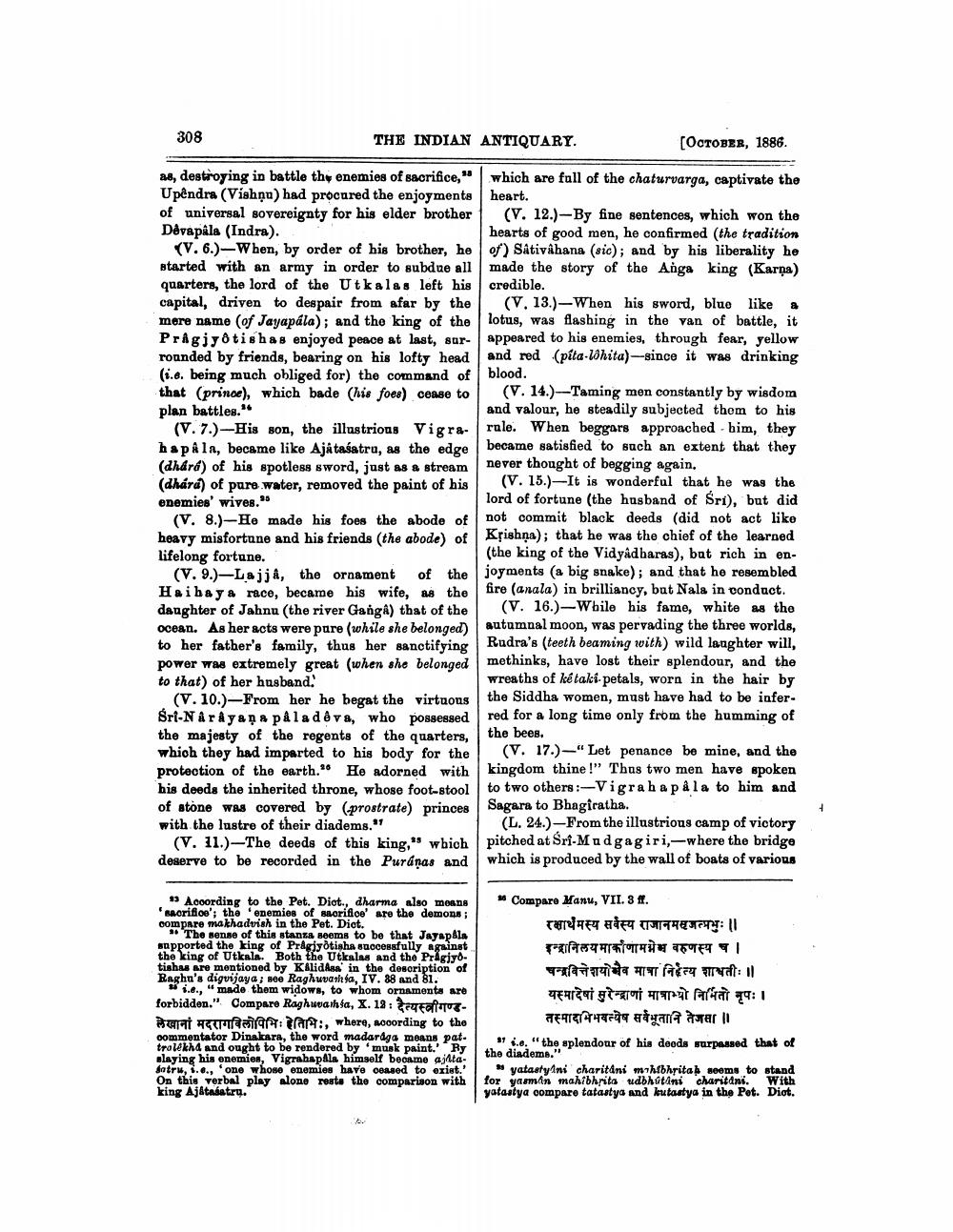________________
308
THE INDIAN ANTIQUARY.
as, destroying in battle the enemies of sacrifice," Upêndra (Vishnu) had procured the enjoyments of universal sovereignty for his elder brother Dêvapala (Indra).
(V. 6.)-When, by order of his brother, he started with an army in order to subdue all quarters, the lord of the Utkalas left his capital, driven to despair from afar by the mere name (of Jayapála); and the king of the Pragjyotishas enjoyed peace at last, surrounded by friends, bearing on his lofty head (i.e. being much obliged for) the command of that (prince), which bade (his foes) cease to plan battles."
(V. 7.)-His son, the illustrious Vigrahapala, became like Ajàtasatru, as the edge (dhárd) of his spotless sword, just as a stream (dhára) of pure water, removed the paint of his enemies' wives.35
(V. 8.)-He made his foes the abode of heavy misfortune and his friends (the abode) of lifelong fortune.
(V. 9.)-Lajja, the ornament of the Haihaya race, became his wife, as the daughter of Jahnu (the river Ganga) that of the ocean. As her acts were pure (while she belonged) to her father's family, thus her sanctifying power was extremely great (when she belonged to that) of her husband.
(V. 10.)-From her he begat the virtuous Sri-Narayana paladeva, who possessed the majesty of the regents of the quarters, which they had imparted to his body for the protection of the earth. He adorned with his deeds the inherited throne, whose foot-stool of stone was covered by (prostrate) princes with the lustre of their diadems."
(V. 11.) The deeds of this king," which deserve to be recorded in the Puranas and
13 According to the Pet. Dict., dharma also means 'sacrifice'; the enemies of sacrifice' are the demons; compare makhadvish in the Pet. Dict.
The sense of this stanza seems to be that Jayapala supported the king of Pragjyotisha successfully against the king of Utkala. Both the Utkalas and the Pragjyotishas are mentioned by Kalidasa in the description of Raghn's digvijaya; see Raghuvashia, IV. 88 and 81.
i.e., "made them widows, to whom ornaments are forbidden." Compare Raghuvahia, X. 13:
-
लेखानां मदरागविलोपिभिः हेतिभिः, where, sooording to the commentator Dinakara, the word madaraga means pattralekha and ought to be rendered by 'musk paint.' By slaying his enemies, Vigrahapala himself became ajutaSatru, .e., one whose enemies have ceased to exist." On this verbal play alone rests the comparison with king Ajatasatru.
[OCTOBER, 1886. which are full of the chaturvarga, captivate the heart.
(V. 12.)-By fine sentences, which won the hearts of good men, he confirmed (the tradition of) Sâtivâhana (sic); and by his liberality he made the story of the Anga king (Karna) credible.
(V. 13.)-When his sword, blue like a lotus, was flashing in the van of battle, it appeared to his enemies, through fear, yellow and red (pita-lôhita)-since it was drinking blood.
(V. 14.)-Taming men constantly by wisdom and valour, he steadily subjected them to his rule. When beggars approached him, they became satisfied to such an extent that they never thought of begging again.
(V. 15.) It is wonderful that he was the lord of fortune (the husband of Sri), but did not commit black deeds (did not act like Krishna); that he was the chief of the learned (the king of the Vidyadharas), but rich in enjoyments (a big snake); and that he resembled fire (anala) in brilliancy, but Nala in conduct.
(V. 16.)-While his fame, white as the autumnal moon, was pervading the three worlds, Rudra's (teeth beaming with) wild laughter will, methinks, have lost their splendour, and the wreaths of kétaki-petals, worn in the hair by the Siddha women, must have had to be inferred for a long time only from the humming of the bees.
(V. 17.)-"Let penance be mine, and the kingdom thine!" Thus two men have spoken to two others:-Vigrahapala to him and Sagara to Bhagiratha.
(L. 24.)-From the illustrious camp of victory pitched at Sri-Madgagiri,-where the bridge which is produced by the wall of boats of various
38 Compare Manu, VII. 3 ff.
रक्षार्थमस्य सर्वस्य राजानमसृजत्प्रभुः ॥ इन्द्रानिलय मार्काणामप्रेम वरुणस्य च । चन्द्रवित्तेशयो चैव मात्रा निहेत्य शाश्वतीः ॥ यस्मादेषां सुरेन्द्राणां मात्राभ्यो निर्मितो नृपः । तस्मादभिभवत्येष सर्वभूतानि तेजसा ॥
7.e. "the splendour of his deeds surpassed that of the diadems."
yatastyini charitâni mhibhritab seems to stand for yasman mahibhrita udbhutani charitâni. With yatastya compare tatastya and kutastya in the Pet. Diot.




